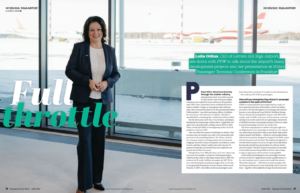RIX Riga Airport has revised its road map for achieving zero CO2e emissions and set 2035 as the new target deadline.
Throughout 2024, the current diesel-powered passenger buses at the airport will be replaced by electric buses, with the airport starting to replace fossil diesel with synthetic fuels in 2025, increasing by at least 10% each year, phasing out the use of fossil fuels altogether by 2035.
RIX Riga Airport’s net zero emissions plan
To achieve zero CO2e emissions, the airport plans to focus on two main elements. First is reducing the airport’s own emissions from electricity, heat and fuel consumption to as close to zero as possible. The second is neutralizing emissions that cannot be reduced through CO2e sequestration.
The procurement and production of renewable energy, replacement of heating equipment, replacement of internal combustion engine machinery with alternative modes of transportation and the increase of energy efficiency are all key steps on the new Riga Airport net zero road map. The amount of green energy purchased by the airport is expected to increase by an average of 10% annually, while solar power generation from the airport’s solar parks is expected to reach 14% of the total electricity needs of the company by 2026.
At the same time, Riga Airport is already involved in an international Interreg-funded project on the research and implementation of hydrogen technologies in aviation, cooperating with public transportation and other transportation service providers to reduce CO2e emissions and develop sustainable aviation fuels.
Sustainable aviation at RIX Riga Airport
Laila Odiņa, chairperson of the board of RIX Riga Airport, said, “We have reviewed the emission reduction targets and objectives set out in both the airport’s medium-term strategy and sustainability strategy and are ready to set a much more ambitious timeline to achieve net zero. Although the initial deadline of the Airports Council International Europe (ACI Europe) ‘Net Zero 2050’ commitment was to achieve climate neutrality by 2050, Riga Airport, along with many other European airports, believes that by working with determination, this goal can be achieved earlier, by 2035. Riga Airport also has a greater responsibility to contribute to the global climate goals, having achieved the Diamond Category in last year’s Sustainability Index and aiming to be certified to the next level of the Airport Carbon Accreditation (ACA) program. Globally, various financial institutions are also paying much more attention to achieve more ambitious climate goals, with the support of which aviation development is being financed.”
For more of the top insights into the future of RIX Riga Airport, read Passenger Terminal World’s exclusive interview with Laila Odina, CEO of Latvia’s RIX Riga Airport, here.


